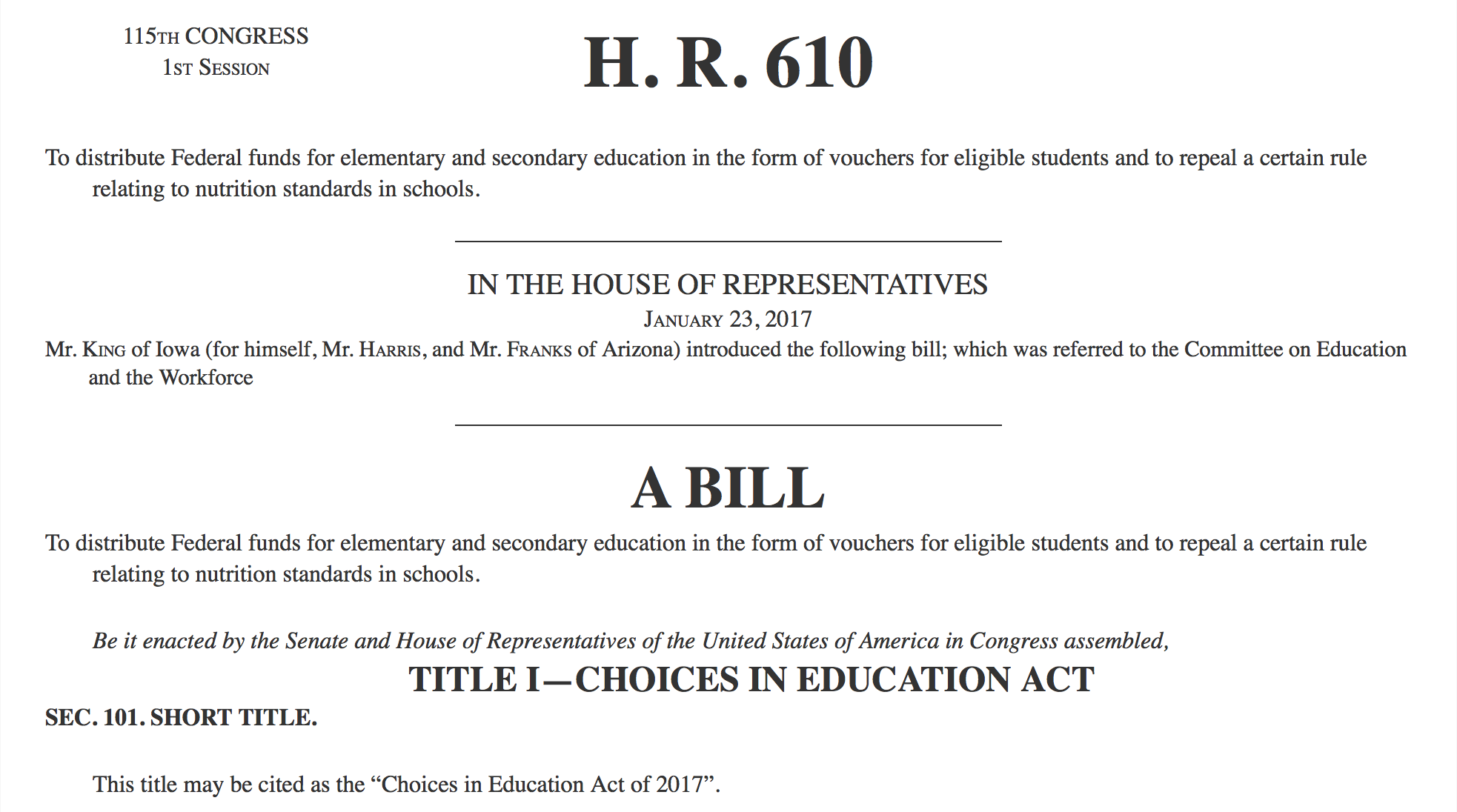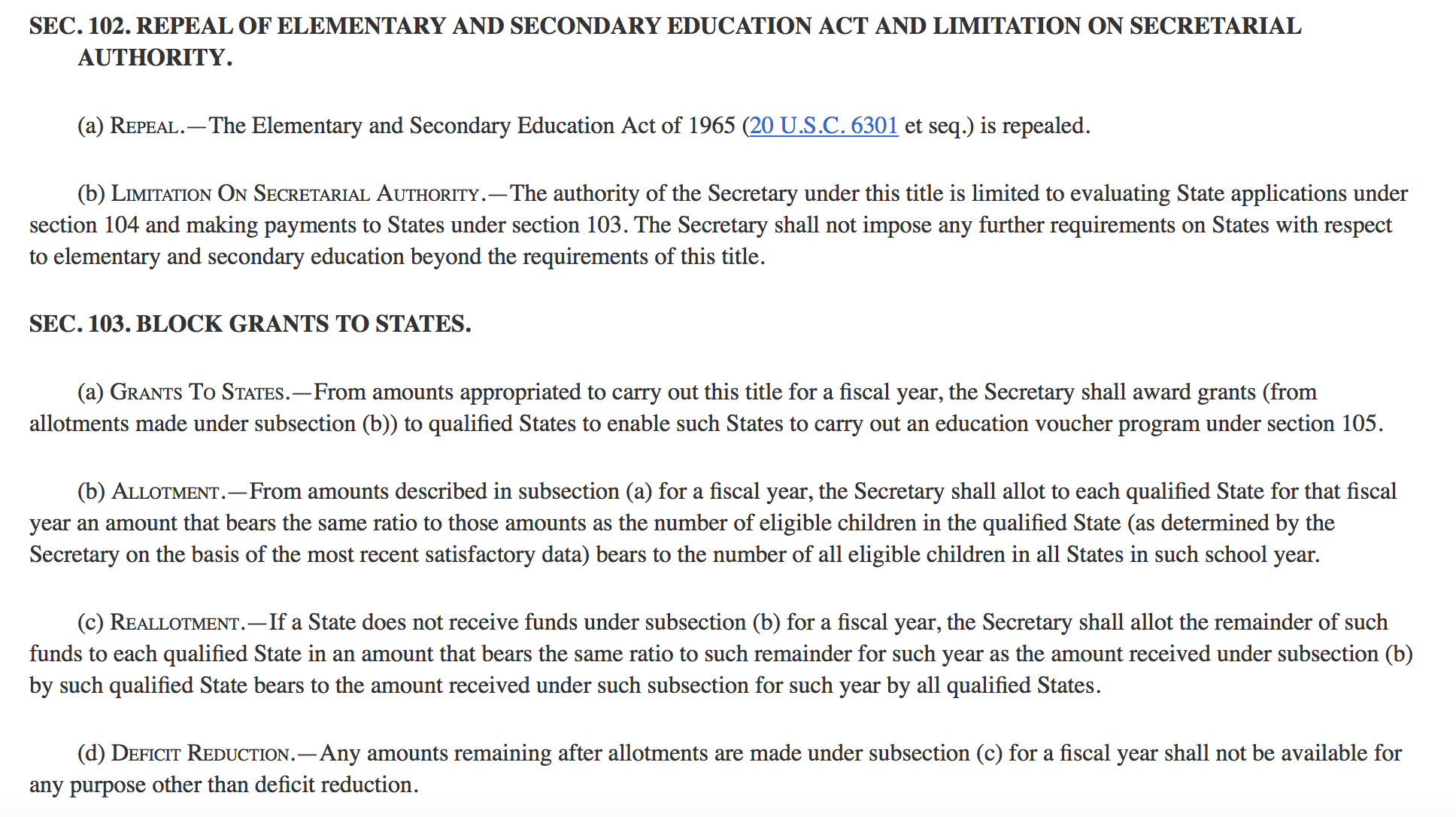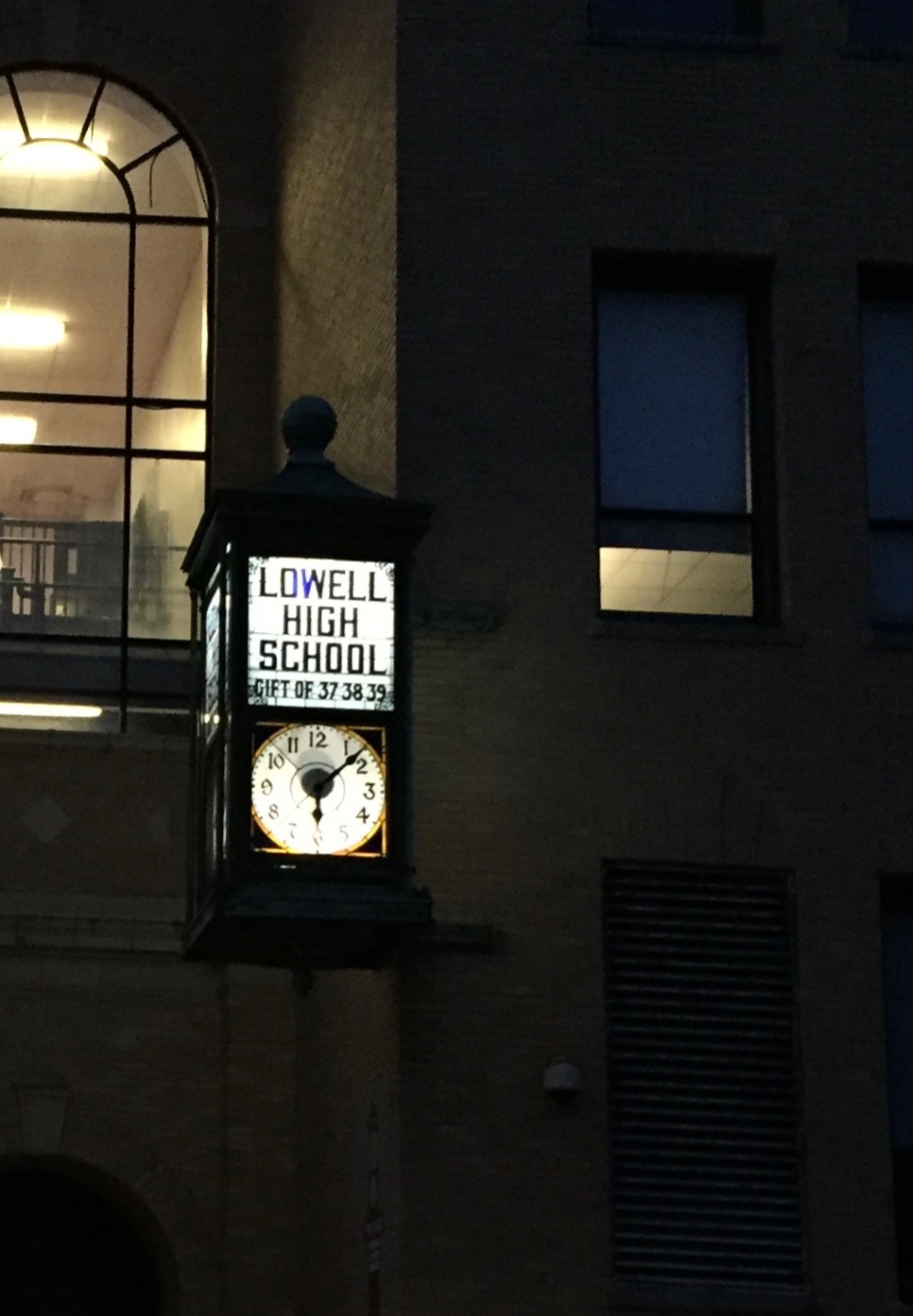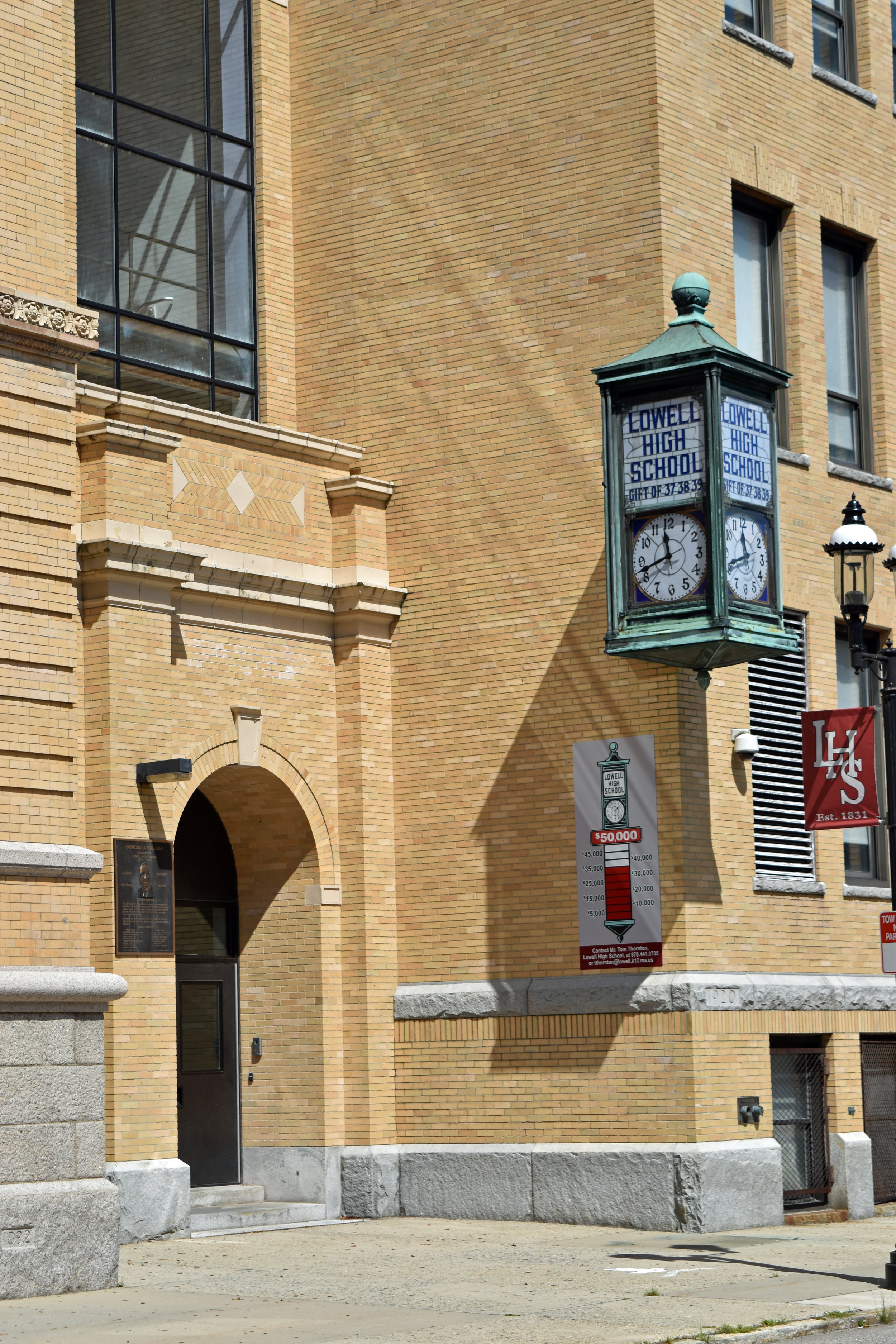 School Committee Meeting 15 February 20176 present, SC Descoteaux absent, Student representative: Onoste OmoyeniMr. Gignac requests taking Eagle Scout Michael Wojas’ report on textile recycling out of order.Permissions to EnterUsually the Permissions to Enter are not all that controversial. Not tonight. The inclusion of a request for $4,921,313 for Aramark (1 year contract extension) generated about 45 minutes of discussion (my comments follow).$4,981,113 in expenses ($4,921,313 allocated to Aramark in order to exercise a 1-year option for food service management in 2017-18), See detail in the Meeting Packet (downloadable PDF)SC Gignac speaks to some issues he noticed during a recent visit to a satellite school (in food-service lingo, that would be a school where there is no kitchen. The lunches are prepared at another site (the Rogers) and transported.). SC Gignac noted the unappetizing appearance of the food, noting that the hot meal he observed was unidentifiable, and the marginally acceptable freshness. The director of the school shared he/she had to sort through a bin of fresh food (fruit, I believe) and remove rotten food. Mr. Gignac noted that the serving size (the school serves middle- and high-school age youth) was small, the presentation was unappetizing and the quality not acceptable. He notes that some schools with kitchen have experienced similar issues with food service in the past and expresses discomfort in awaarding a 1-year contract extension to Aramark.The Aramark representative (name not given) cites some possible transportation issues that resulted in the food quality; however, the portion sizes provided are regulated by USDA and Aramark adheres to those portion regulations.SC Gignac questions why satellite schools do not have more than one food choice. Aramark representative states there are some choices (hot meal, salad, and sandwich choice). Both SC Gignac and SC Hoey who were making a visit noted that on this visit a salad and “hot meal” were offered, but not the sandwich option which should have offered. Both SC members note that school lunch is especially important to students in this setting as the in-school meal is possibly the only meal the students access. SC Gignac repeats that he would like to see an improvement prior to awarding an extension. SC Hoey notes that the quality of food at the alternative school (LeBlanc) was poor; the food quality was unacceptable and needs to be improved. SC Gignac photographed the food he observed during his school visit and shared that image with other school committee members.SC Doherty proposes a motion like to take the Aramark expenditure out of Permissions to Enter.The unnamed Aramark representative mentions that the Lowell management group is working with Worcester’s operation to learn if there are improvements that can be initiated in Lowell. Mayor Kennedy asks for explanation as to why a sandwich choice would have be missing from a day’s delivery (snow days, delivery issues, food choice not ordered). If I understood this conversation correctly, there was an assertion that the school clerk at times makes lunch selection decisions (see my comments following). A second Aramark representative, Sharon Lagasse, visited Worcester’s satellite program and explains that the hope is to learn some techniques for efficiency that could be implemented in Lowell to improve satellite school food service.SC Gignac asks for permission for LeBlanc Social Worker to speak to the concerns from the school’s perspective (older students need more food/larger portion, noticing the difference in portion sizes and options offered at LHS (where some of the students at this school originate) causes students to feel that they don’t deserve equitably food service quality, and sometimes lunch offering is a motivation for students to attend school).Dr. Khelfaoui asserts that delaying the line item approval is a bad idea. He expresses disappointment that he is hearing about the meal issues for the first time at this school committee meeting. States that he will issue a directive about the procedure for lunch choice will be in place as of tomorrow and feels this is a communication issue, not a food quality issue.SC Gendron asks if delaying this line item from tonight's Permissions until next meeting would have any ill-effects. Mr. Frisch feels he can give a report of what corrections can be or have been be implemented by the next meeting and the line item can be re-entered. Ms. Omoyeni speaks in favor of SC Doherty’s motion - not a punitive process but an investigative process. Roll call 6 yeas, 1 absent, approved.Some years ago, there was an effort to provide students with more than one choice for lunch: a hot choice, a salad, and a sandwich. To manage food preparations, students at the elementary school where I taught (which did have a kitchen), made their lunch choice of lunch from the menu when they arrived in the morning. Those lunch counts were sent to the school clerk in the morning and forwarded to the kitchen staff. In a satellite school, I’d imagine that a similar process takes place with the count of how many lunches of each category sent to the central kitchen by the school’s clerk. The policy at the time in the school in which I worked was that students who arrived tardy, were served the hot lunch choice by default. I wonder if the reference to a clerk “making lunch choices” might be confused with the clerk transmitting lunch counts and, if a student arrived tardy, the sandwich/salad choices were not available for practicality. School lunch, as some Committee Members noted, can sometimes be the only real meal a student eats during a day - that is a sad fact for some students living below the poverty line. Lunches that are unappealing and fresh foods that have gone beyond expiration should never be served no matter what. Pressing the pause button before engaging an extension of a food contract, even a one-year contract, not only sends the message that the School Committee cares about the quality of meals served to our students, but lets a very large corporate contractor know that the expectation for quality and healthy food service is a priority. As Ms. Omoyeni noted, this pause is not punitive, it is informative.SC Martin does not participate in the CTI line item for permission to enter ($9,000). 5 yeas, 2 absent, approved.All other permissions were approved (6 yeas, 1 absent, approved).MotionsThree motions made, all by SC Doherty.
School Committee Meeting 15 February 20176 present, SC Descoteaux absent, Student representative: Onoste OmoyeniMr. Gignac requests taking Eagle Scout Michael Wojas’ report on textile recycling out of order.Permissions to EnterUsually the Permissions to Enter are not all that controversial. Not tonight. The inclusion of a request for $4,921,313 for Aramark (1 year contract extension) generated about 45 minutes of discussion (my comments follow).$4,981,113 in expenses ($4,921,313 allocated to Aramark in order to exercise a 1-year option for food service management in 2017-18), See detail in the Meeting Packet (downloadable PDF)SC Gignac speaks to some issues he noticed during a recent visit to a satellite school (in food-service lingo, that would be a school where there is no kitchen. The lunches are prepared at another site (the Rogers) and transported.). SC Gignac noted the unappetizing appearance of the food, noting that the hot meal he observed was unidentifiable, and the marginally acceptable freshness. The director of the school shared he/she had to sort through a bin of fresh food (fruit, I believe) and remove rotten food. Mr. Gignac noted that the serving size (the school serves middle- and high-school age youth) was small, the presentation was unappetizing and the quality not acceptable. He notes that some schools with kitchen have experienced similar issues with food service in the past and expresses discomfort in awaarding a 1-year contract extension to Aramark.The Aramark representative (name not given) cites some possible transportation issues that resulted in the food quality; however, the portion sizes provided are regulated by USDA and Aramark adheres to those portion regulations.SC Gignac questions why satellite schools do not have more than one food choice. Aramark representative states there are some choices (hot meal, salad, and sandwich choice). Both SC Gignac and SC Hoey who were making a visit noted that on this visit a salad and “hot meal” were offered, but not the sandwich option which should have offered. Both SC members note that school lunch is especially important to students in this setting as the in-school meal is possibly the only meal the students access. SC Gignac repeats that he would like to see an improvement prior to awarding an extension. SC Hoey notes that the quality of food at the alternative school (LeBlanc) was poor; the food quality was unacceptable and needs to be improved. SC Gignac photographed the food he observed during his school visit and shared that image with other school committee members.SC Doherty proposes a motion like to take the Aramark expenditure out of Permissions to Enter.The unnamed Aramark representative mentions that the Lowell management group is working with Worcester’s operation to learn if there are improvements that can be initiated in Lowell. Mayor Kennedy asks for explanation as to why a sandwich choice would have be missing from a day’s delivery (snow days, delivery issues, food choice not ordered). If I understood this conversation correctly, there was an assertion that the school clerk at times makes lunch selection decisions (see my comments following). A second Aramark representative, Sharon Lagasse, visited Worcester’s satellite program and explains that the hope is to learn some techniques for efficiency that could be implemented in Lowell to improve satellite school food service.SC Gignac asks for permission for LeBlanc Social Worker to speak to the concerns from the school’s perspective (older students need more food/larger portion, noticing the difference in portion sizes and options offered at LHS (where some of the students at this school originate) causes students to feel that they don’t deserve equitably food service quality, and sometimes lunch offering is a motivation for students to attend school).Dr. Khelfaoui asserts that delaying the line item approval is a bad idea. He expresses disappointment that he is hearing about the meal issues for the first time at this school committee meeting. States that he will issue a directive about the procedure for lunch choice will be in place as of tomorrow and feels this is a communication issue, not a food quality issue.SC Gendron asks if delaying this line item from tonight's Permissions until next meeting would have any ill-effects. Mr. Frisch feels he can give a report of what corrections can be or have been be implemented by the next meeting and the line item can be re-entered. Ms. Omoyeni speaks in favor of SC Doherty’s motion - not a punitive process but an investigative process. Roll call 6 yeas, 1 absent, approved.Some years ago, there was an effort to provide students with more than one choice for lunch: a hot choice, a salad, and a sandwich. To manage food preparations, students at the elementary school where I taught (which did have a kitchen), made their lunch choice of lunch from the menu when they arrived in the morning. Those lunch counts were sent to the school clerk in the morning and forwarded to the kitchen staff. In a satellite school, I’d imagine that a similar process takes place with the count of how many lunches of each category sent to the central kitchen by the school’s clerk. The policy at the time in the school in which I worked was that students who arrived tardy, were served the hot lunch choice by default. I wonder if the reference to a clerk “making lunch choices” might be confused with the clerk transmitting lunch counts and, if a student arrived tardy, the sandwich/salad choices were not available for practicality. School lunch, as some Committee Members noted, can sometimes be the only real meal a student eats during a day - that is a sad fact for some students living below the poverty line. Lunches that are unappealing and fresh foods that have gone beyond expiration should never be served no matter what. Pressing the pause button before engaging an extension of a food contract, even a one-year contract, not only sends the message that the School Committee cares about the quality of meals served to our students, but lets a very large corporate contractor know that the expectation for quality and healthy food service is a priority. As Ms. Omoyeni noted, this pause is not punitive, it is informative.SC Martin does not participate in the CTI line item for permission to enter ($9,000). 5 yeas, 2 absent, approved.All other permissions were approved (6 yeas, 1 absent, approved).MotionsThree motions made, all by SC Doherty.
- 6.I. [J Doherty]: Request the City Manager to provide the Committee with a report that details the City’s Maintenance of Effort Agreement for the last 3 years related to expenditures on the schools. (Typographical error; correction underlined).
Maintenance of Effort funding is sizeable and SC Doherty would like to examine how these services a provided to the schools. SC Hoey supports the motion and thinks the information should have been made available and transparent 25 years ago. Mayor Kennedy thinks it is worthwhile to go through the Maintenance of Effort jointly between Schools and City administrations. Passed.The Maintenance of Effort amounts confuse me; I understand that some services are provided to the school department by the city (data processing, snow removal as examples). Making these expenditures transparent hopefully will improve understanding of costs and funding between the school department and the city.
- 6.II. [J Doherty]: Request the Superintendent provide the committee with a report of the transportation cost estimates of bussing students to a high school at Cawley over the next 12 years based on the number of students by neighborhood currently attending our schools.
SC Doherty would like this information as the Lowell High School project costs are calculated and how those costs might impact future budgeting.
- 6.III. [J Doherty]: Request the Superintendent provide the committee with a report that looks at our K-12 student population by zip code to determine the number of students from each neighborhood.
In addition to this information, SC Gignac asks about the status for zoning of schools. Ms. Durkin notes that the location of a STEM middle school may impact such a report. SC Gendron asks about neighborhood zoning (moving from city-wide to neighborhood bus scenarios); Ms. Durkin can include this; however, the desegregation plan either has to be vacated or adhered to and this will have an impact on creating city-wide busing. The creation of City-wide schools was a result of the desegregation plan and ensure that equity is achieved. SC Martin notes the profound impact of vacating a desegregation order (she would not be opposed to such a move if it negates the primacy of every child attending a desegregated school in Lowell). PassedReports of the SuperintendentThere were 8 items under Reports of the Superintendent.
- 7.I Knowledge Bowl Schedule (see packet for dates and competition details)
- 7.II Lowell High School Graduation Date & Speaker Announcement (see packet for information)
- 7.III. Response To Robert Gignac's Motion Of 01/18/17 Regarding Extracurricular Activities Throughout The District
SC Gignac requests the addition of how many student participate.
- 7.IV. Response To Jacqueline Doherty’s Motion Of 01/18/17 Regarding The Time Allocated For Recess, Lunch, Physical Education, And Health
Registered speaker (Darcie Boyer) member of City-wide Parent Council and LEJA. Thanks the administration for report but notes the disparity of times across the schools. The CPC will examine this issue in more detail at their next meeting. Notes the importance of lunch/nourishment and free time to student well-being.So many studies remind and inform us that in order to be ready for of learning and retain learning, students need a balance of “down time” - play and academic time. Students of all ages need to be active, to expend excess energy, to socialize, to have a brain break. So with all this information on the importance of social and emotional health, why do schools continue to shave away recess time? Why are 6 and 7 year olds asked to sit still and work their brains without a break? As the academic demands have increased on students, the response has generally been to increase "time on task" to the point that young learners are expected to sit still far beyond what they are developmentally capable of doing. Here's a link from Harvard Medical School as an example of why it is so important to give students down time, but don't stop with just one opinion. Fifteen minutes of recess (which oftentimes includes getting ready to go outside and walking to the play area); 20 minutes (or less) to walk to the cafeteria, go through a lunch line, and eat - none of this is adequate for student well-being.SC Doherty thanks administration for the information; notes 10-minute recess, 15-minute lunches do not include transport. Makes a motion to refer report jointly to Curriculum and Student Services subcommittees to find some way to return to other aspects now that NCLB has been replaced by ESSA. SC Martin would like some additional information about the disparity of times between urban and suburban districts. Passed.
- 7.V. Monthly Budget Report
- 7.VI and 7.VII School Calendar and School Committee Meeting Dates for 2017-18
- 7.VIII. Personnel Report
All superintendent’s reports 7.I through 7.V passed. 7.VI approved by roll call (6 yeas, 1 absent, approved). 7.VII (first reading - no action). 7.VIII approved.New Business:Educational Research request approved (6 yeas, 1 absent, approved)(Taken out of order): Michael Wojas, a LHS 2016 graduate, gives an update on his Eagle Scout project, a textile recycling effort which was a collaboration with Lowell’s Solid Waste and Recycling as well as Bay State Textiles. Mr. Wojas who is enlisting in the Navy at the end of February, has designed a project to recycle effort. The monies raised through the recycling project results in some fundraising based on the amount of textiles collected and recycled. Currently, recycling boxes are sited at 15 Lowell schools, with the hope that middle schools will become involved in the near future. To date just under 2,000 pounds of textiles resulting in rebates of $7,731 which then go to support the schools. The Lincoln School, Morey School and Reilly School have been the top collectors of textiles. The bin upkeep is maintained by Bay State Textiles at no cost to the City.Meeting detail and support documentation can be found here.
 School Committee Meeting 05 April 20177 Members Present, Student representative: Cole Conlin Spotlight on Excellence & Permissions to Enter.
School Committee Meeting 05 April 20177 Members Present, Student representative: Cole Conlin Spotlight on Excellence & Permissions to Enter.
 I was thinking about
I was thinking about  I wonder how many other adults have experienced this? After about 30 minutes of intense focus, there is a need to get up and move. For me, moving around when I am actively engaging my brain applies in nearly every circumstance, and I notice it most especially during some training or class when my brain is powered up and I'm trying hard to retain new information.An article republished in the New York Times' Well column made me think of how sitting and movement impact learning for all students regardless of age level. Written for runners and titled
I wonder how many other adults have experienced this? After about 30 minutes of intense focus, there is a need to get up and move. For me, moving around when I am actively engaging my brain applies in nearly every circumstance, and I notice it most especially during some training or class when my brain is powered up and I'm trying hard to retain new information.An article republished in the New York Times' Well column made me think of how sitting and movement impact learning for all students regardless of age level. Written for runners and titled  According to the current Secretary of Education, Betsy DeVos, parents need to have a choice in a child's education. It appears, however, that "choice" has limits.According to state and federal government, there should be a "choice" of educational setting. School setting is a choice, whether it is public, charter, private, or religious. That's a good choice according to the government. Using federal funds to pay for vouchers? That's the current federal proposal. And our government claims that that kind of choice is also a "good" choice.However, if you exercise your parental judgement by choosing to opt your child out of long, arduous, standardized tests like MCAS 2.0 or PARCC, then your choice as a parent is questionable. The Massachusetts Department of Elementary and Secondary Education really does not want parents to make that choice. Why? Because in assessments, unless a significant number of students participate in those tests, the reported results may become skewed or inaccurate.The issue of test participation rates is part of the newest federal education act, ESSA (Every Student Succeeds Act). The current
According to the current Secretary of Education, Betsy DeVos, parents need to have a choice in a child's education. It appears, however, that "choice" has limits.According to state and federal government, there should be a "choice" of educational setting. School setting is a choice, whether it is public, charter, private, or religious. That's a good choice according to the government. Using federal funds to pay for vouchers? That's the current federal proposal. And our government claims that that kind of choice is also a "good" choice.However, if you exercise your parental judgement by choosing to opt your child out of long, arduous, standardized tests like MCAS 2.0 or PARCC, then your choice as a parent is questionable. The Massachusetts Department of Elementary and Secondary Education really does not want parents to make that choice. Why? Because in assessments, unless a significant number of students participate in those tests, the reported results may become skewed or inaccurate.The issue of test participation rates is part of the newest federal education act, ESSA (Every Student Succeeds Act). The current  Something happened this evening preventing the live broadcast of Lowell's School Committee Meeting for March 1. Until the taped meeting materializes, there won't be any notes about what transpired; however, this doesn't mean there isn't anything to think about.Found in the Permissions to Enter, are 4 requests totaling $882,470. All of these requests are expenditures from the Special Education Tuition account and are for Out of District (OOD) costs to agencies servicing student Individual Education Plans (IEPs).When the services necessary to provide a free and adequate education for a student cannot be met within the local school district, they must be contracted out. It is the
Something happened this evening preventing the live broadcast of Lowell's School Committee Meeting for March 1. Until the taped meeting materializes, there won't be any notes about what transpired; however, this doesn't mean there isn't anything to think about.Found in the Permissions to Enter, are 4 requests totaling $882,470. All of these requests are expenditures from the Special Education Tuition account and are for Out of District (OOD) costs to agencies servicing student Individual Education Plans (IEPs).When the services necessary to provide a free and adequate education for a student cannot be met within the local school district, they must be contracted out. It is the  In thinking about what might happen should a voucher program become reality, I took a look at what currently occurs with traditional public schools and charter schools. Charter Schools should reflect a similar demographic to the local public school district. In principle, sometimes charter schools do, but sometimes they do not.In Lowell, the
In thinking about what might happen should a voucher program become reality, I took a look at what currently occurs with traditional public schools and charter schools. Charter Schools should reflect a similar demographic to the local public school district. In principle, sometimes charter schools do, but sometimes they do not.In Lowell, the 
 Neither of the two charter schools have special education students needing either substantially separate services or separate schools/facilities/homebound-hospital placements?So as the proponents of a voucher, or "choice" system continue to push their agenda forward, I'll be watching to see if those hollering about choice for all families and students really mean
Neither of the two charter schools have special education students needing either substantially separate services or separate schools/facilities/homebound-hospital placements?So as the proponents of a voucher, or "choice" system continue to push their agenda forward, I'll be watching to see if those hollering about choice for all families and students really mean  If you don't know about H.R. 610, here is a link to the text and the bill's progress. I urge you to follow it and, if you feel strongly about it, respond to it. While my Congressional Representative is not a member of the House Committee currently reviewing this legislation, I want her to know exactly how this bill will impact our Local Education Agency (LEA).A tacked on provision in this legislation can be found at the very end: dismantling (my word) of the No Hungry Kids Act. Under the No Hungry Kids Act, fruit and vegetable offerings increased and low- and non-fat milk was offered. Those requirements would be removed. Additionally, the proposal in HR610 would eliminate monitoring school lunch/breakfast choices for sodium, trans fats and saturated fats.Why does this matter? Childhood and adult obesity continues to be a factor in health and well-being. In school food programs students are exposed to healthier eating options. If you are unfamiliar with the effects of less healthy food choices, read
If you don't know about H.R. 610, here is a link to the text and the bill's progress. I urge you to follow it and, if you feel strongly about it, respond to it. While my Congressional Representative is not a member of the House Committee currently reviewing this legislation, I want her to know exactly how this bill will impact our Local Education Agency (LEA).A tacked on provision in this legislation can be found at the very end: dismantling (my word) of the No Hungry Kids Act. Under the No Hungry Kids Act, fruit and vegetable offerings increased and low- and non-fat milk was offered. Those requirements would be removed. Additionally, the proposal in HR610 would eliminate monitoring school lunch/breakfast choices for sodium, trans fats and saturated fats.Why does this matter? Childhood and adult obesity continues to be a factor in health and well-being. In school food programs students are exposed to healthier eating options. If you are unfamiliar with the effects of less healthy food choices, read  Remember the episode
Remember the episode
 So here are some of my questions:The funding: Although HR610 does not come right out and say it directly, can we all suppose that by eliminating the Elementary & Secondary Act of 1965 and all of the amendments, any further funding of current federal grant programs will disappear? And through elimination of this funding source, what services currently available to students and families will disappear?This financial report, from the Feb. 15 2017 Lowell School Committee Meeting shows the sources of Grant Funding and expenditures to date. <
So here are some of my questions:The funding: Although HR610 does not come right out and say it directly, can we all suppose that by eliminating the Elementary & Secondary Act of 1965 and all of the amendments, any further funding of current federal grant programs will disappear? And through elimination of this funding source, what services currently available to students and families will disappear?This financial report, from the Feb. 15 2017 Lowell School Committee Meeting shows the sources of Grant Funding and expenditures to date. <

 School Committee Meeting 15 February 20176 present, SC Descoteaux absent, Student representative: Onoste OmoyeniMr. Gignac requests taking Eagle Scout Michael Wojas’ report on textile recycling out of order.Permissions to EnterUsually the Permissions to Enter are not all that controversial. Not tonight. The inclusion of a request for $4,921,313 for Aramark (1 year contract extension) generated about 45 minutes of discussion (my comments follow).$4,981,113 in expenses ($4,921,313 allocated to Aramark in order to exercise a 1-year option for food service management in 2017-18), See detail in the
School Committee Meeting 15 February 20176 present, SC Descoteaux absent, Student representative: Onoste OmoyeniMr. Gignac requests taking Eagle Scout Michael Wojas’ report on textile recycling out of order.Permissions to EnterUsually the Permissions to Enter are not all that controversial. Not tonight. The inclusion of a request for $4,921,313 for Aramark (1 year contract extension) generated about 45 minutes of discussion (my comments follow).$4,981,113 in expenses ($4,921,313 allocated to Aramark in order to exercise a 1-year option for food service management in 2017-18), See detail in the  6 present, 1 absent (S. Gendron) Onoste Omoyeni represented the students during this meeting.After approval of minutes, SC Gignac requests Lowell HS Subcommittee/Joint Facilities meeting be taken out of order. Permissions to Enter$20,665 in expenses approved, See detail in the Meeting Packet (
6 present, 1 absent (S. Gendron) Onoste Omoyeni represented the students during this meeting.After approval of minutes, SC Gignac requests Lowell HS Subcommittee/Joint Facilities meeting be taken out of order. Permissions to Enter$20,665 in expenses approved, See detail in the Meeting Packet ( Somewhere back in my past, someone in my family - possibly my Grandmother - showed me how to knit and purl. And I'm pretty good with that as far as it goes. For the rest, I turn to Youtube videos. My grip on knitting skills is pretty tenuous, but I can make a mean scarf, a basic hat, and once I even made a pair of mittens.So when the Womens' march linked to published directions for signature Pussy Hats, well the pattern seemed like something I could handle, so I decided to give it a try. It would have been a lot easier had I not waited until the last possible moment to try to find pink yarn. I've learned that using a different yarn weight is not an easy change to make. However, I got some stellar advice from a local yarn shop, an easier pattern (!), and a set of circular needles. Love those circular needles.Working with the much more bulky yarn that I was able to procure, produced a first hat that could have fit two heads. Despite having many students look at me over my career as if I
Somewhere back in my past, someone in my family - possibly my Grandmother - showed me how to knit and purl. And I'm pretty good with that as far as it goes. For the rest, I turn to Youtube videos. My grip on knitting skills is pretty tenuous, but I can make a mean scarf, a basic hat, and once I even made a pair of mittens.So when the Womens' march linked to published directions for signature Pussy Hats, well the pattern seemed like something I could handle, so I decided to give it a try. It would have been a lot easier had I not waited until the last possible moment to try to find pink yarn. I've learned that using a different yarn weight is not an easy change to make. However, I got some stellar advice from a local yarn shop, an easier pattern (!), and a set of circular needles. Love those circular needles.Working with the much more bulky yarn that I was able to procure, produced a first hat that could have fit two heads. Despite having many students look at me over my career as if I  School Committee Meeting 18 January 20176 present, 1 absentSpotlight on Excellence:Tonight’s Spotlight on Excellence featured the Stem Academy at the Rogers School and the meeting started with the Pledge of Allegiance led by STEM Academy students. With over 600 students in Pre-K to Grade 5, the students in Grade 4 were nominated to not only present, but create the slideshow presented to the Committee. Most impressively, students from the STEM Academy are at varying stages of English language acquisition and powerfully demonstrate the integration of academic content.First up, 2 students demonstrate a “spheros”, controlling it from keypads. The students’ demonstration highlighted the importance of experimentation and the scientific process and how their attempts at controlling the Spheros through a maze informed solutions to problems.Working with the US Dept. of Wildlife, 3 students explained their project with Blandings Turtles. Investigating these turtles led students to investigate the impact of humans on the turtle habitat. The students not only have done research into their topic, they are creating a website about their subject.The third project, Block Coding utilizing
School Committee Meeting 18 January 20176 present, 1 absentSpotlight on Excellence:Tonight’s Spotlight on Excellence featured the Stem Academy at the Rogers School and the meeting started with the Pledge of Allegiance led by STEM Academy students. With over 600 students in Pre-K to Grade 5, the students in Grade 4 were nominated to not only present, but create the slideshow presented to the Committee. Most impressively, students from the STEM Academy are at varying stages of English language acquisition and powerfully demonstrate the integration of academic content.First up, 2 students demonstrate a “spheros”, controlling it from keypads. The students’ demonstration highlighted the importance of experimentation and the scientific process and how their attempts at controlling the Spheros through a maze informed solutions to problems.Working with the US Dept. of Wildlife, 3 students explained their project with Blandings Turtles. Investigating these turtles led students to investigate the impact of humans on the turtle habitat. The students not only have done research into their topic, they are creating a website about their subject.The third project, Block Coding utilizing  School Committee Meeting 04 January 2017All members present.Prior to the beginning of the regular agenda, there was a Special Meeting of the School Committee in order to discuss a contract offer for the Superintendent of Schools. SC Hoey made a motion to accept the last contract offer from the Superintendent; however the most recent offer - the one presented to the Committee at this meeting - had been through some contract revisions suggested by both parties and the Law Department. SC Gendron makes a substitute motion to go into Executive Session in order to discuss the changes being presented tonight (passes 6 yeas, 1 nay). The Committee then went into Executive Session for the purpose of discussing the most recent iteration of the Superintendent’s contract. The Executive Session seems to have ended around 7:08 pm without approval of a Superintendent’s contract. The regular School Committee Meeting begins at 7:18 pm.Permissions to Enter$361,751 in expenses approved, See detail in the
School Committee Meeting 04 January 2017All members present.Prior to the beginning of the regular agenda, there was a Special Meeting of the School Committee in order to discuss a contract offer for the Superintendent of Schools. SC Hoey made a motion to accept the last contract offer from the Superintendent; however the most recent offer - the one presented to the Committee at this meeting - had been through some contract revisions suggested by both parties and the Law Department. SC Gendron makes a substitute motion to go into Executive Session in order to discuss the changes being presented tonight (passes 6 yeas, 1 nay). The Committee then went into Executive Session for the purpose of discussing the most recent iteration of the Superintendent’s contract. The Executive Session seems to have ended around 7:08 pm without approval of a Superintendent’s contract. The regular School Committee Meeting begins at 7:18 pm.Permissions to Enter$361,751 in expenses approved, See detail in the  Huffington Post published a blog entry by Gay Groover Christmus recently that resonated with me as a retired educator who taught pre-
Huffington Post published a blog entry by Gay Groover Christmus recently that resonated with me as a retired educator who taught pre- Six present, Ms. Martin AbsentPrior to the beginning of the regular agenda, SC Gignac makes a motion to refer Item 13 to Negotiations subcommittee. Item 13 was a report of the Superintendent for the Policy on Admission of Children of Non-resident School Employees . Public input and/or comment will be allowed during the subcommittee's meeting when that meeting is scheduled.Spotlight on ExcellencePawtucketville Memorial Elementary School recently was recognized by National Title I Association for closing the student achievement gap and is one of two Massachusetts receiving recognition for their achievements. Principal McLean described the collaborative culture at the Pawtucketville Memorial Elementary School that brought this school from the 11th percentile (meaning 89% of all other schools performed better) to the 57th percentile over 5 years. The school’s achievement is impressive and national recognition of the school is well deserved. A large contingent of PMES teachers also attended last evening’s meeting. Over February School vacation, members of the school faculty have been invited to attend the annual Title I meeting in California where they will receive national recognition.A second spotlight on excellence highlighted the United Teachers of Lowell’s FirstBook “Books on Wheels” event where over 450 educators and 2,000 students received free new books. A video of the event can be found
Six present, Ms. Martin AbsentPrior to the beginning of the regular agenda, SC Gignac makes a motion to refer Item 13 to Negotiations subcommittee. Item 13 was a report of the Superintendent for the Policy on Admission of Children of Non-resident School Employees . Public input and/or comment will be allowed during the subcommittee's meeting when that meeting is scheduled.Spotlight on ExcellencePawtucketville Memorial Elementary School recently was recognized by National Title I Association for closing the student achievement gap and is one of two Massachusetts receiving recognition for their achievements. Principal McLean described the collaborative culture at the Pawtucketville Memorial Elementary School that brought this school from the 11th percentile (meaning 89% of all other schools performed better) to the 57th percentile over 5 years. The school’s achievement is impressive and national recognition of the school is well deserved. A large contingent of PMES teachers also attended last evening’s meeting. Over February School vacation, members of the school faculty have been invited to attend the annual Title I meeting in California where they will receive national recognition.A second spotlight on excellence highlighted the United Teachers of Lowell’s FirstBook “Books on Wheels” event where over 450 educators and 2,000 students received free new books. A video of the event can be found  Within the past week, our United Teachers of Lowell organized and hosted a FirstBook "Books on Wheels" event where over 2000 students and their families received free books. As we sorted and organized 40,000+ books, we heard about a fire in a near-by Lawrence school, the Bruce School, and the impact of the loss on students, teachers and classrooms. What could we do to help? Hearing that the destruction impacted 7th and 8th grade classrooms, we set aside over 500 books from our event to donate to the Bruce School. The books were selected by Lowell middle-school teachers working to unpack pallets, boxed up by students and educators who were volunteering at our event, and picked up on Saturday - our event's distribution day - by the Principal of the Bruce School and the Lawrence Schools COO. One would think this would be a feel-good moment. Not so fast.We sent a press release
Within the past week, our United Teachers of Lowell organized and hosted a FirstBook "Books on Wheels" event where over 2000 students and their families received free books. As we sorted and organized 40,000+ books, we heard about a fire in a near-by Lawrence school, the Bruce School, and the impact of the loss on students, teachers and classrooms. What could we do to help? Hearing that the destruction impacted 7th and 8th grade classrooms, we set aside over 500 books from our event to donate to the Bruce School. The books were selected by Lowell middle-school teachers working to unpack pallets, boxed up by students and educators who were volunteering at our event, and picked up on Saturday - our event's distribution day - by the Principal of the Bruce School and the Lawrence Schools COO. One would think this would be a feel-good moment. Not so fast.We sent a press release  School Committee Meeting 16 November 2016Six present, Mayor Kennedy Absent (SC Gendron presiding)The attention of the School Committe was on the Middle School Report (Item 12) and Joint Subcommittee Minutes.Special Order of BusinessSC Gendron introduces both Principal Carmona of the Lincoln School and Francey Slater from Mill City Grows to speak about the recent Lincoln School Garden construction; a project video can be found
School Committee Meeting 16 November 2016Six present, Mayor Kennedy Absent (SC Gendron presiding)The attention of the School Committe was on the Middle School Report (Item 12) and Joint Subcommittee Minutes.Special Order of BusinessSC Gendron introduces both Principal Carmona of the Lincoln School and Francey Slater from Mill City Grows to speak about the recent Lincoln School Garden construction; a project video can be found